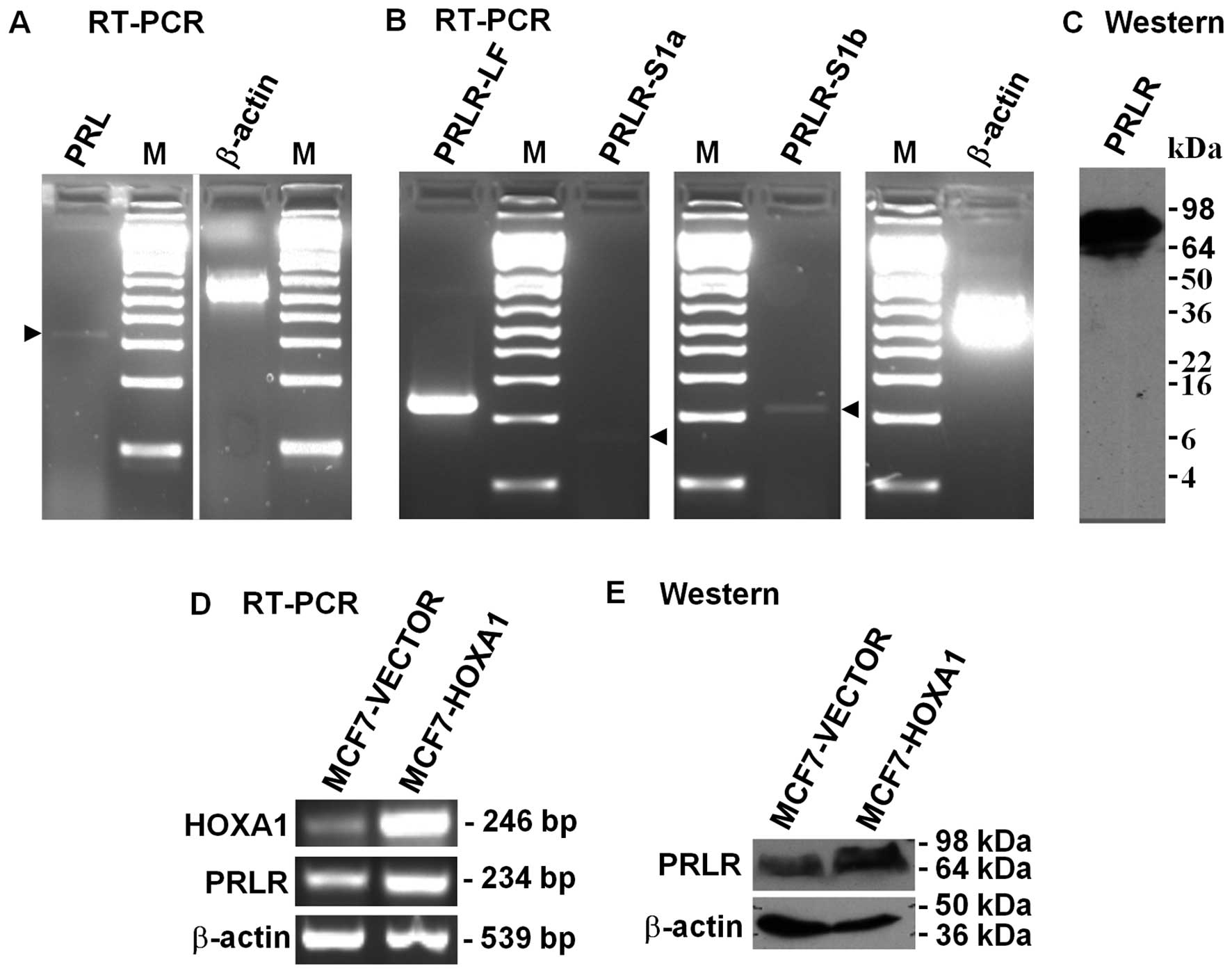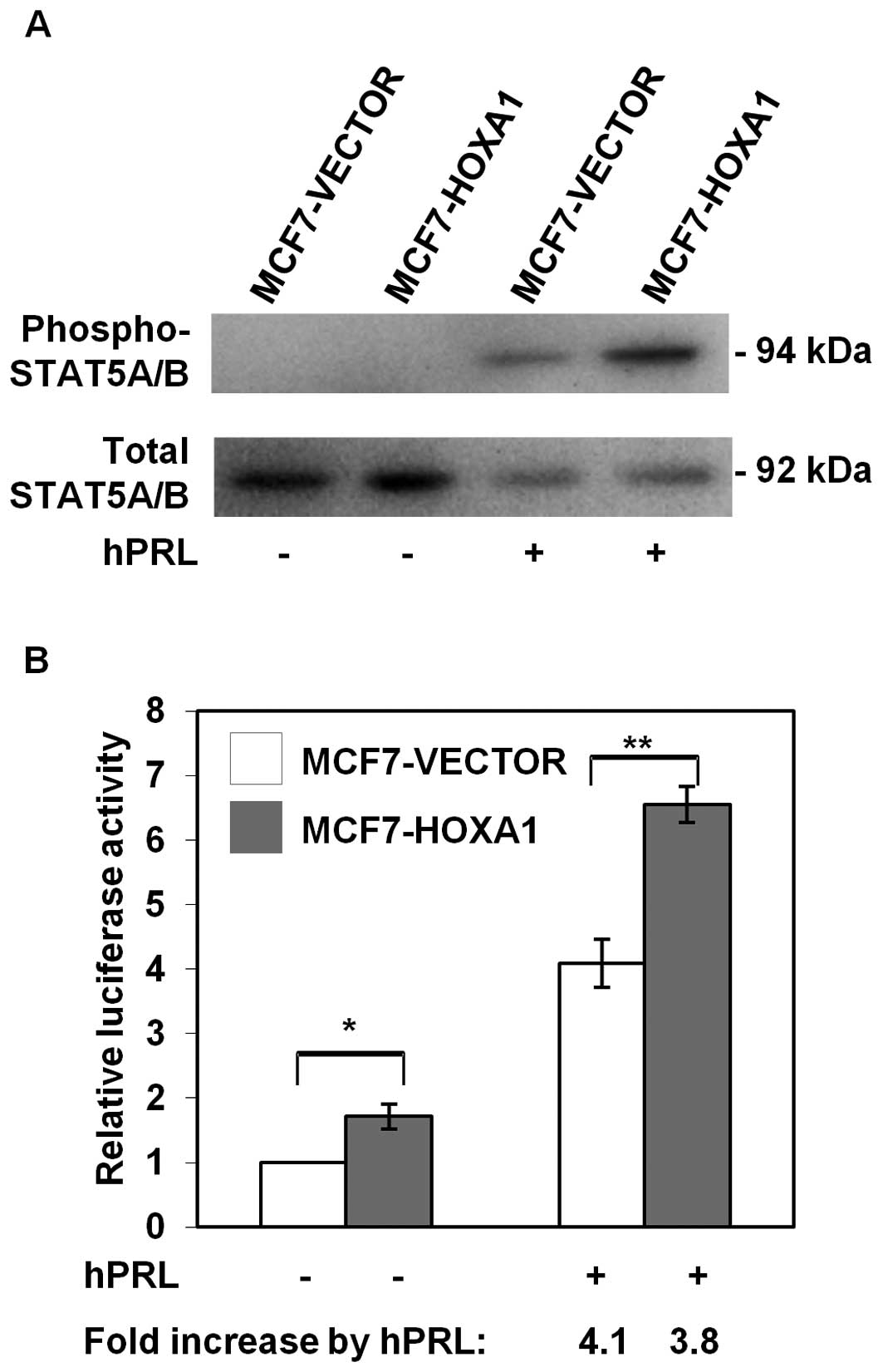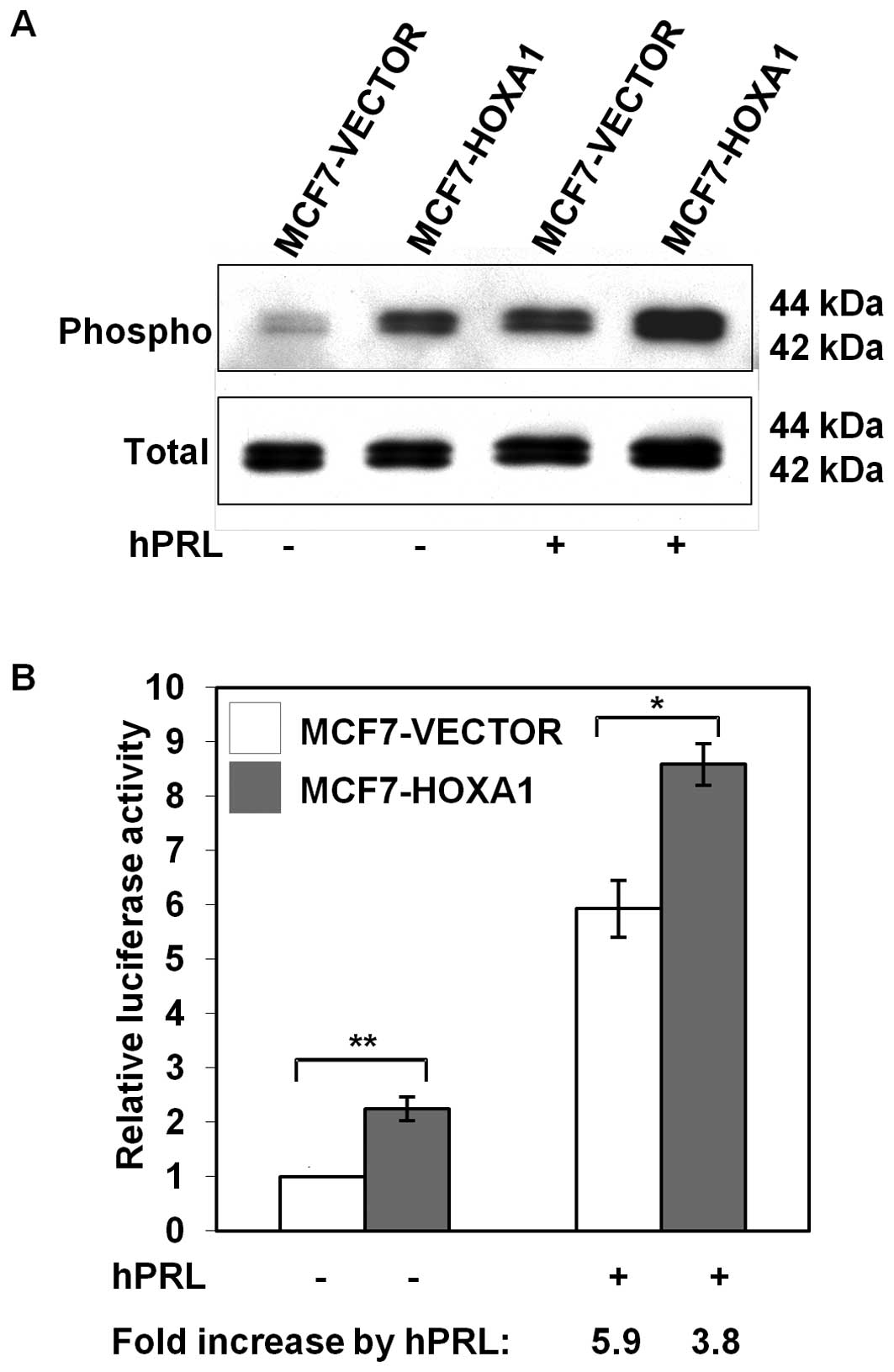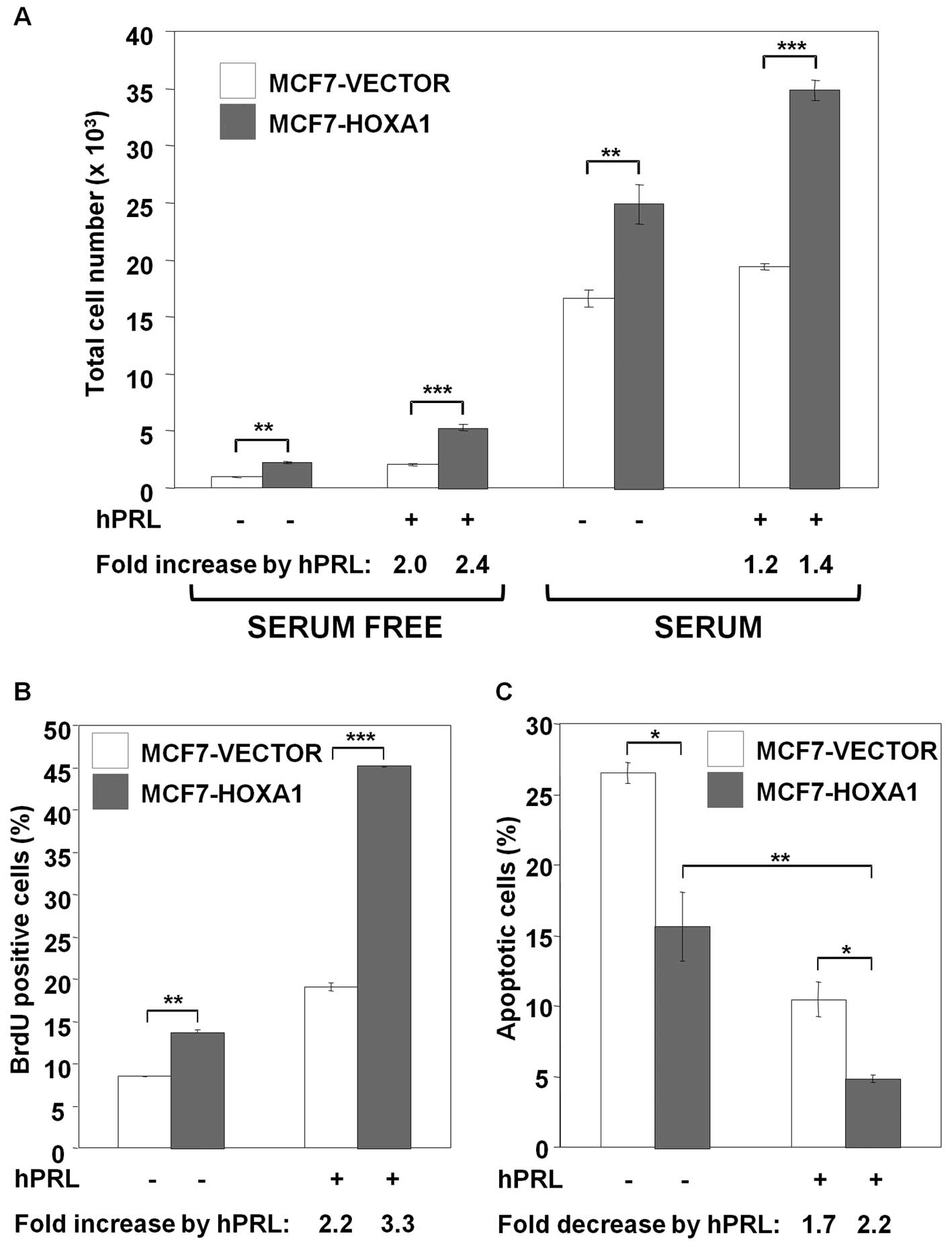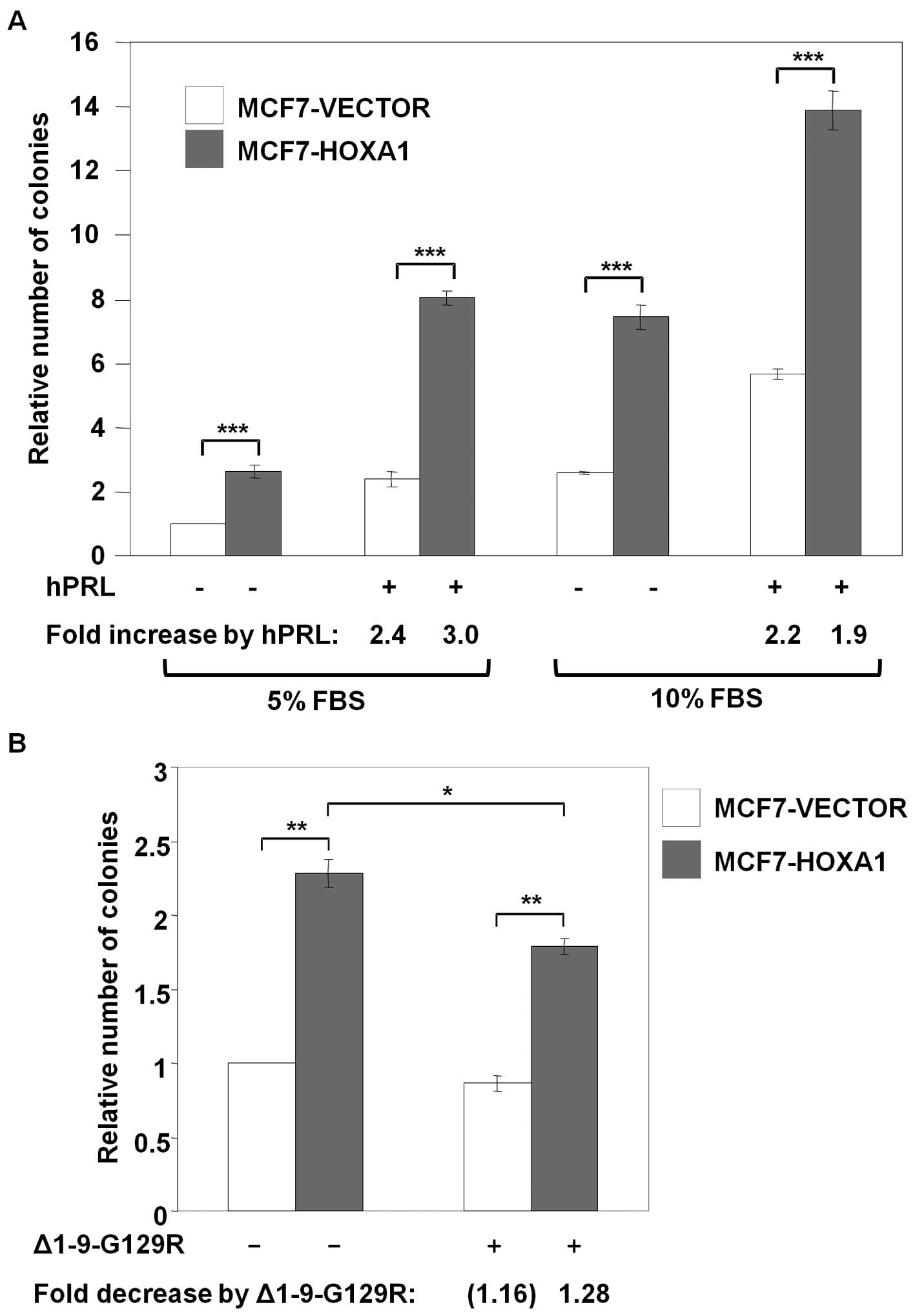|
1.
|
Gray S, Pandha HS, Michael A, Middleton G
and Morgan R: HOX genes in pancreatic development and cancer. JOP.
12:216–219. 2011.PubMed/NCBI
|
|
2.
|
Shah N and Sukumar S: The Hox genes and
their roles in oncogenesis. Nat Rev Cancer. 10:361–371. 2010.
View Article : Google Scholar : PubMed/NCBI
|
|
3.
|
Morgan R, Pirard PM, Shears L, Sohal J,
Pettengell R and Pandha HS: Antagonism of HOX/PBX dimer formation
blocks the in vivo proliferation of melanoma. Cancer Res.
67:5806–5813. 2007. View Article : Google Scholar : PubMed/NCBI
|
|
4.
|
Daniels TR, Neacato II, Rodriguez JA,
Pandha HS, Morgan R and Penichet ML: Disruption of HOX activity
leads to cell death that can be enhanced by the interference of
iron uptake in malignant B cells. Leukemia. 24:1555–1565. 2010.
View Article : Google Scholar : PubMed/NCBI
|
|
5.
|
Shears L, Plowright L, Harrington K,
Pandha HS and Morgan R: Disrupting the interaction between HOX and
PBX causes necrotic and apoptotic cell death in the renal cancer
lines CaKi-2 and 769-P. J Urol. 180:2196–2201. 2008. View Article : Google Scholar : PubMed/NCBI
|
|
6.
|
Plowright L, Harrington KJ, Pandha HS and
Morgan R: HOX transcription factors are potential therapeutic
targets in non-small-cell lung cancer (targeting HOX genes in lung
cancer). Br J Cancer. 100:470–475. 2009. View Article : Google Scholar : PubMed/NCBI
|
|
7.
|
Aulisa L, Forraz N, McGuckin C and
Hartgerink JD: Inhibition of cancer cell proliferation by designed
peptide amphiphiles. Acta Biomater. 5:842–853. 2009. View Article : Google Scholar : PubMed/NCBI
|
|
8.
|
Morgan R, Plowright L, Harrington KJ,
Michael A and Pandha HS: Targeting HOX and PBX transcription
factors in ovarian cancer. BMC Cancer. 10:892010. View Article : Google Scholar : PubMed/NCBI
|
|
9.
|
Jung C, Kim RS, Lee SJ, Wang C and Jeng
MH: HOXB13 homeodomain protein suppresses the growth of prostate
cancer cells by the negative regulation of T-cell factor 4. Cancer
Res. 64:3046–3051. 2004. View Article : Google Scholar : PubMed/NCBI
|
|
10.
|
Zhang X, Zhu T, Chen Y, Mertani HC, Lee KO
and Lobie PE: Human growth hormone-regulated HOXA1 is a human
mammary epithelial oncogene. J Biol Chem. 278:7580–7590. 2003.
View Article : Google Scholar : PubMed/NCBI
|
|
11.
|
Friedmann Y, Daniel CA, Strickland P and
Daniel CW: Hox genes in normal and neoplastic mouse mammary gland.
Cancer Res. 54:5981–5985. 1994.PubMed/NCBI
|
|
12.
|
Raman V, Martensen SA, Reisman D, et al:
Compromised HOXA5 function can limit p53 expression in human breast
tumours. Nature. 405:974–978. 2000. View Article : Google Scholar : PubMed/NCBI
|
|
13.
|
Wu X, Chen H, Parker B, et al: HOXB7, a
homeodomain protein, is overexpressed in breast cancer and confers
epithelial-mesenchymal transition. Cancer Res. 66:9527–9534. 2006.
View Article : Google Scholar : PubMed/NCBI
|
|
14.
|
Makiyama K, Hamada J, Takada M, et al:
Aberrant expression of HOX genes in human invasive breast
carcinoma. Oncol Rep. 13:673–679. 2005.PubMed/NCBI
|
|
15.
|
Lumsden A and Krumlauf R: Patterning the
vertebrate neuraxis. Science. 274:1109–1115. 1996. View Article : Google Scholar
|
|
16.
|
Chariot A, Moreau L, Senterre G, Sobel ME
and Castronovo V: Retinoic acid induces three newly cloned HOXA1
transcripts in MCF7 breast cancer cells. Biochem Biophys Res
Commun. 215:713–720. 1995. View Article : Google Scholar : PubMed/NCBI
|
|
17.
|
Maulbecker CC and Gruss P: The oncogenic
potential of deregulated homeobox genes. Cell Growth Differ.
4:431–441. 1993.PubMed/NCBI
|
|
18.
|
Chariot A and Castronovo V: Detection of
HOXA1 expression in human breast cancer. Biochem Biophys Res
Commun. 222:292–297. 1996. View Article : Google Scholar : PubMed/NCBI
|
|
19.
|
Mohankumar KM, Xu XQ, Zhu T, et al:
HOXA1-stimulated oncogenicity is mediated by selective upregulation
of components of the p44/42 MAP kinase pathway in human mammary
carcinoma cells. Oncogene. 26:3998–4008. 2007. View Article : Google Scholar
|
|
20.
|
Jacobson EM, Hugo ER, Borcherding DC and
Ben-Jonathan N: Prolactin in breast and prostate cancer: molecular
and genetic perspectives. Discov Med. 11:315–324. 2011.PubMed/NCBI
|
|
21.
|
Fernandez I, Touraine P and Goffin V:
Prolactin and human tumourogenesis. J Neuroendocrinol. 22:771–777.
2010.
|
|
22.
|
Ben-Jonathan N, Mershon JL, Allen DL and
Steinmetz RW: Extrapituitary prolactin: distribution, regulation,
functions, and clinical aspects. Endocr Rev. 17:639–669.
1996.PubMed/NCBI
|
|
23.
|
Zinger M, McFarland M and Ben-Jonathan N:
Prolactin expression and secretion by human breast glandular and
adipose tissue explants. J Clin Endocrinol Metab. 88:689–696. 2003.
View Article : Google Scholar : PubMed/NCBI
|
|
24.
|
Bhatavdekar JM, Patel DD, Shah NG, et al:
Prolactin as a local growth promoter in patients with breast
cancer: GCRI experience. Eur J Surg Oncol. 26:540–547. 2000.
View Article : Google Scholar : PubMed/NCBI
|
|
25.
|
Reynolds C, Montone KT, Powell CM,
Tomaszewski JE and Clevenger CV: Expression of prolactin and its
receptor in human breast carcinoma. Endocrinology. 138:5555–5560.
1997.PubMed/NCBI
|
|
26.
|
Touraine P, Martini JF, Zafrani B, et al:
Increased expression of prolactin receptor gene assessed by
quantitative polymerase chain reaction in human breast tumors
versus normal breast tissues. J Clin Endocrinol Metab. 83:667–674.
1998. View Article : Google Scholar
|
|
27.
|
Tran-Thanh D, Arneson NC, Pintilie M, et
al: Amplification of the prolactin receptor gene in mammary lobular
neoplasia. Breast Cancer Res Treat. 128:31–40. 2011. View Article : Google Scholar : PubMed/NCBI
|
|
28.
|
Bogorad RL, Courtillot C, Mestayer C, et
al: Identification of a gain-of-function mutation of the prolactin
receptor in women with benign breast tumors. Proc Natl Acad Sci
USA. 105:14533–14538. 2008. View Article : Google Scholar : PubMed/NCBI
|
|
29.
|
Bouilly J, Sonigo C, Auffret J, Gibori G
and Binart N: Prolactin signaling mechanisms in ovary. Mol Cell
Endocrinol. 356:80–87. 2012. View Article : Google Scholar : PubMed/NCBI
|
|
30.
|
Goffin V, Bernichtein S, Touraine P and
Kelly PA: Development and potential clinical uses of human
prolactin receptor antagonists. Endocr Rev. 26:400–422. 2005.
View Article : Google Scholar : PubMed/NCBI
|
|
31.
|
Clevenger CV, Furth PA, Hankinson SE and
Schuler LA: The role of prolactin in mammary carcinoma. Endocr Rev.
24:1–27. 2003. View Article : Google Scholar : PubMed/NCBI
|
|
32.
|
Bole-Feysot C, Goffin V, Edery M, Binart N
and Kelly PA: Prolactin (PRL) and its receptor: actions, signal
transduction pathways and phenotypes observed in PRL receptor
knockout mice. Endocr Rev. 19:225–268. 1998. View Article : Google Scholar : PubMed/NCBI
|
|
33.
|
Kirken RA, Malabarba MG, Xu J, et al:
Prolactin stimulates serine/tyrosine phosphorylation and formation
of heterocomplexes of multiple Stat5 isoforms in Nb2 lymphocytes. J
Biol Chem. 272:14098–14103. 1997. View Article : Google Scholar : PubMed/NCBI
|
|
34.
|
Brockman JL, Schroeder MD and Schuler LA:
PRL activates the cyclin D1 promoter via the Jak2/Stat pathway. Mol
Endocrinol. 16:774–784. 2002. View Article : Google Scholar : PubMed/NCBI
|
|
35.
|
Matsumoto A, Masuhara M, Mitsui K, et al:
CIS, a cytokine inducible SH2 protein, is a target of the JAK-STAT5
pathway and modulates STAT5 activation. Blood. 89:3148–3154.
1997.PubMed/NCBI
|
|
36.
|
Zhu T, Starling-Emerald B, Zhang X, et al:
Oncogenic transformation of human mammary epithelial cells by
autocrine human growth hormone. Cancer Res. 65:317–324.
2005.PubMed/NCBI
|
|
37.
|
Liu DX and Lobie PE: Transcriptional
activation of p53 by Pitx1. Cell Death Differ. 14:1893–1907. 2007.
View Article : Google Scholar : PubMed/NCBI
|
|
38.
|
Ma FY, Anderson GM, Gunn TD, Goffin V,
Grattan DR and Bunn SJ: Prolactin specifically activates signal
transducer and activator of transcription 5b in neuroendocrine
dopaminergic neurons. Endocrinology. 146:5112–5119. 2005.
View Article : Google Scholar : PubMed/NCBI
|
|
39.
|
Kang J, Qian PX, Pandey V, et al: Artemin
is estrogen regulated and mediates antiestrogen resistance in
mammary carcinoma. Oncogene. 29:3228–3240. 2010. View Article : Google Scholar : PubMed/NCBI
|
|
40.
|
Wood TJ, Sliva D, Lobie PE, et al:
Mediation of growth hormone-dependent transcriptional activation by
mammary gland factor/Stat 5. J Biol Chem. 270:9448–9453. 1995.
View Article : Google Scholar : PubMed/NCBI
|
|
41.
|
Wood TJ, Sliva D, Lobie PE, et al:
Specificity of transcription enhancement via the STAT responsive
element in the serine protease inhibitor 2.1 promoter. Mol Cell
Endocrinol. 130:69–81. 1997. View Article : Google Scholar : PubMed/NCBI
|
|
42.
|
Clarkson RW, Shang CA, Levitt LK, Howard T
and Waters MJ: Ternary complex factors Elk-1 and Sap-1a mediate
growth hormone-induced transcription of egr-1 (early growth
response factor-1) in 3T3-F442A preadipocytes. Mol Endocrinol.
13:619–631. 1999. View Article : Google Scholar : PubMed/NCBI
|
|
43.
|
Gille H, Kortenjann M, Thomae O, et al:
ERK phosphorylation potentiates Elk-1-mediated ternary complex
formation and transactivation. EMBO J. 14:951–962. 1995.PubMed/NCBI
|
|
44.
|
Janknecht R and Hunter T: Convergence of
MAP kinase pathways on the ternary complex factor Sap-1a. EMBO J.
16:1620–1627. 1997. View Article : Google Scholar : PubMed/NCBI
|
|
45.
|
Rahnama F, Shafiei F, Gluckman PD,
Mitchell MD and Lobie PE: Epigenetic regulation of human
trophoblastic cell migration and invasion. Endocrinology.
147:5275–5283. 2006. View Article : Google Scholar : PubMed/NCBI
|
|
46.
|
Kaulsay KK, Zhu T, Bennett W, Lee KO and
Lobie PE: The effects of autocrine human growth hormone (hGH) on
human mammary carcinoma cell behavior are mediated via the hGH
receptor. Endocrinology. 142:767–777. 2001.PubMed/NCBI
|
|
47.
|
Del BG, Darzynkiewicz Z, Degraef C,
Mosselmans R, Fokan D and Galand P: Comparison of methods based on
annexin-V binding, DNA content or TUNEL for evaluating cell death
in HL-60 and adherent MCF-7 cells. Cell Prolif. 32:25–37. 1999.
View Article : Google Scholar : PubMed/NCBI
|
|
48.
|
Bernichtein S, Kayser C, Dillner K, et al:
Development of pure prolactin receptor antagonists. J Biol Chem.
278:35988–35999. 2003. View Article : Google Scholar : PubMed/NCBI
|
|
49.
|
Fields K, Kulig E and Lloyd RV: Detection
of prolactin messenger RNA in mammary and other normal and
neoplastic tissues by polymerase chain reaction. Lab Invest.
68:354–360. 1993.PubMed/NCBI
|
|
50.
|
Ginsburg E and Vonderhaar BK: Prolactin
synthesis and secretion by human breast cancer cells. Cancer Res.
55:2591–2595. 1995.PubMed/NCBI
|
|
51.
|
Nevalainen MT, Valve EM, Ingleton PM,
Nurmi M, Martikainen PM and Harkonen PL: Prolactin and prolactin
receptors are expressed and functioning in human prostate. J Clin
Invest. 99:618–627. 1997. View Article : Google Scholar : PubMed/NCBI
|
|
52.
|
Clevenger CV, Chang WP, Ngo W, Pasha TL,
Montone KT and Tomaszewski JE: Expression of prolactin and
prolactin receptor in human breast carcinoma. Evidence for an
autocrine/paracrine loop. Am J Pathol. 146:695–705. 1995.PubMed/NCBI
|
|
53.
|
Meng J, Tsai-Morris CH and Dufau ML: Human
prolactin receptor variants in breast cancer: low ratio of short
forms to the long-form human prolactin receptor associated with
mammary carcinoma. Cancer Res. 64:5677–5682. 2004. View Article : Google Scholar : PubMed/NCBI
|
|
54.
|
Li Y, Clevenger CV, Minkovsky N, et al:
Stabilization of prolactin receptor in breast cancer cells.
Oncogene. 25:1896–1902. 2006. View Article : Google Scholar : PubMed/NCBI
|
|
55.
|
Benbassat C, Shoba LN, Newman M, Adamo ML,
Frank SJ and Lowe WL Jr: Growth hormone-mediated regulation of
insulin-like growth factor I promoter activity in C6 glioma cells.
Endocrinology. 140:3073–3081. 1999.PubMed/NCBI
|
|
56.
|
Galsgaard ED, Gouilleux F, Groner B, Serup
P, Nielsen JH and Billestrup N: Identification of a growth
hormone-responsive STAT5-binding element in the rat insulin 1 gene.
Mol Endocrinol. 10:652–660. 1996.PubMed/NCBI
|
|
57.
|
Bergad PL, Shih HM, Towle HC,
Schwarzenberg SJ and Berry SA: Growth hormone induction of hepatic
serine protease inhibitor 2.1 transcription is mediated by a
Stat5-related factor binding synergistically to two gamma-activated
sites. J Biol Chem. 270:24903–24910. 1995. View Article : Google Scholar
|
|
58.
|
Freedman VH and Shin SI: Cellular
tumorigenicity in nude mice: correlation with cell growth in
semi-solid medium. Cell. 3:355–359. 1974. View Article : Google Scholar : PubMed/NCBI
|
|
59.
|
Rouet V, Bogorad RL, Kayser C, et al:
Local prolactin is a target to prevent expansion of basal/stem
cells in prostate tumors. Proc Natl Acad Sci USA. 107:15199–15204.
2010. View Article : Google Scholar : PubMed/NCBI
|
|
60.
|
Vomachka AJ, Pratt SL, Lockefeer JA and
Horseman ND: Prolactin gene-disruption arrests mammary gland
development and retards T-antigen-induced tumor growth. Oncogene.
19:1077–1084. 2000. View Article : Google Scholar : PubMed/NCBI
|
|
61.
|
Oakes SR, Robertson FG, Kench JG, et al:
Loss of mammary epithelial prolactin receptor delays tumor
formation by reducing cell proliferation in low-grade preinvasive
lesions. Oncogene. 26:543–553. 2007. View Article : Google Scholar : PubMed/NCBI
|
|
62.
|
Ormandy CJ, Hall RE, Manning DL, et al:
Coexpression and cross-regulation of the prolactin receptor and sex
steroid hormone receptors in breast cancer. J Clin Endocrinol
Metab. 82:3692–3699. 1997.PubMed/NCBI
|
|
63.
|
Mertani HC, Garcia-Caballero T, Lambert A,
et al: Cellular expression of growth hormone and prolactin
receptors in human breast disorders. Int J Cancer. 79:202–211.
1998. View Article : Google Scholar : PubMed/NCBI
|
|
64.
|
Galsgaard ED, Rasmussen BB, Folkesson CG,
et al: Re-evaluation of the prolactin receptor expression in human
breast cancer. J Endocrinol. 201:115–128. 2009. View Article : Google Scholar : PubMed/NCBI
|
|
65.
|
Bernichtein S, Touraine P and Goffin V:
New concepts in prolactin biology. J Endocrinol. 206:1–11. 2010.
View Article : Google Scholar : PubMed/NCBI
|
|
66.
|
Tworoger SS and Hankinson SE: Prolactin
and breast cancer etiology: an epidemiologic perspective. J Mammary
Gland Biol Neoplasia. 13:41–53. 2008. View Article : Google Scholar : PubMed/NCBI
|
|
67.
|
Wu ZS, Yang K, Wan Y, et al: Tumor
expression of human growth hormone and human prolactin predict a
worse survival outcome in patients with mammary or endometrial
carcinoma. J Clin Endocrinol Metab. 96:E1619–E1629. 2011.
View Article : Google Scholar : PubMed/NCBI
|
|
68.
|
Schroeder MD, Symowicz J and Schuler LA:
PRL modulates cell cycle regulators in mammary tumor epithelial
cells. Mol Endocrinol. 16:45–57. 2002. View Article : Google Scholar : PubMed/NCBI
|
|
69.
|
Tan SH and Nevalainen MT: Signal
transducer and activator of transcription 5A/B in prostate and
breast cancers. Endocr Relat Cancer. 15:367–390. 2008. View Article : Google Scholar
|
|
70.
|
Wagner KU and Rui H: Jak2/Stat5 signaling
in mammogenesis, breast cancer initiation and progression. J
Mammary Gland Biol Neoplasia. 13:93–103. 2008. View Article : Google Scholar : PubMed/NCBI
|
|
71.
|
Su B and Karin M: Mitogen-activated
protein kinase cascades and regulation of gene expression. Curr
Opin Immunol. 8:402–411. 1996. View Article : Google Scholar : PubMed/NCBI
|
|
72.
|
van BT, Hawes BE, Luttrell DK, et al:
Receptor-tyrosine-kinase- and Gβγ-mediated MAP kinase activation by
a common signalling pathway. Nature. 376:781–784. 1995.
|
|
73.
|
Kim EK and Choi EJ: Pathological roles of
MAPK signaling pathways in human diseases. Biochim Biophys Acta.
1802:396–405. 2010. View Article : Google Scholar : PubMed/NCBI
|
|
74.
|
Mansour SJ, Matten WT, Hermann AS, et al:
Transformation of mammalian cells by constitutively active MAP
kinase kinase. Science. 265:966–970. 1994. View Article : Google Scholar : PubMed/NCBI
|
|
75.
|
Grant S: Cotargeting survival signaling
pathways in cancer. J Clin Invest. 118:3003–3006. 2008. View Article : Google Scholar : PubMed/NCBI
|
|
76.
|
Salh B, Marotta A, Matthewson C, et al:
Investigation of the Mek-MAP kinase-Rsk pathway in human breast
cancer. Anticancer Res. 19:731–740. 1999.PubMed/NCBI
|
|
77.
|
Hanahan D and Weinberg RA: Hallmarks of
cancer: the next generation. Cell. 144:646–674. 2011. View Article : Google Scholar : PubMed/NCBI
|
|
78.
|
Llambi F and Green DR: Apoptosis and
oncogenesis: give and take in the BCL-2 family. Curr Opin Genet
Dev. 21:12–20. 2011. View Article : Google Scholar : PubMed/NCBI
|
|
79.
|
Hattori R, Maulik N, Otani H, et al: Role
of STAT3 in ischemic preconditioning. J Mol Cell Cardiol.
33:1929–1936. 2001. View Article : Google Scholar : PubMed/NCBI
|
|
80.
|
Lord JD, McIntosh BC, Greenberg PD and
Nelson BH: The IL-2 receptor promotes lymphocyte proliferation and
induction of the c-myc, bcl-2, and bcl-x genes through the
trans-activation domain of Stat5. J Immunol. 164:2533–2541. 2000.
View Article : Google Scholar : PubMed/NCBI
|
|
81.
|
Manni A, Wright C, Davis G, Glenn J, Joehl
R and Feil P: Promotion by prolactin of the growth of human breast
neoplasms cultured in vitro in the soft agar clonogenic assay.
Cancer Res. 46:1669–1672. 1986.PubMed/NCBI
|
|
82.
|
Howell SJ, Anderson E, Hunter T, Farnie G
and Clarke RB: Prolactin receptor antagonism reduces the clonogenic
capacity of breast cancer cells and potentiates doxorubicin and
paclitaxel cytotoxicity. Breast Cancer Res. 10:R682008. View Article : Google Scholar : PubMed/NCBI
|
|
83.
|
Dagvadorj A, Collins S, Jomain JB, et al:
Autocrine prolactin promotes prostate cancer cell growth via Janus
kinase-2-signal transducer and activator of transcription-5a/b
signaling pathway. Endocrinology. 148:3089–3101. 2007. View Article : Google Scholar : PubMed/NCBI
|















